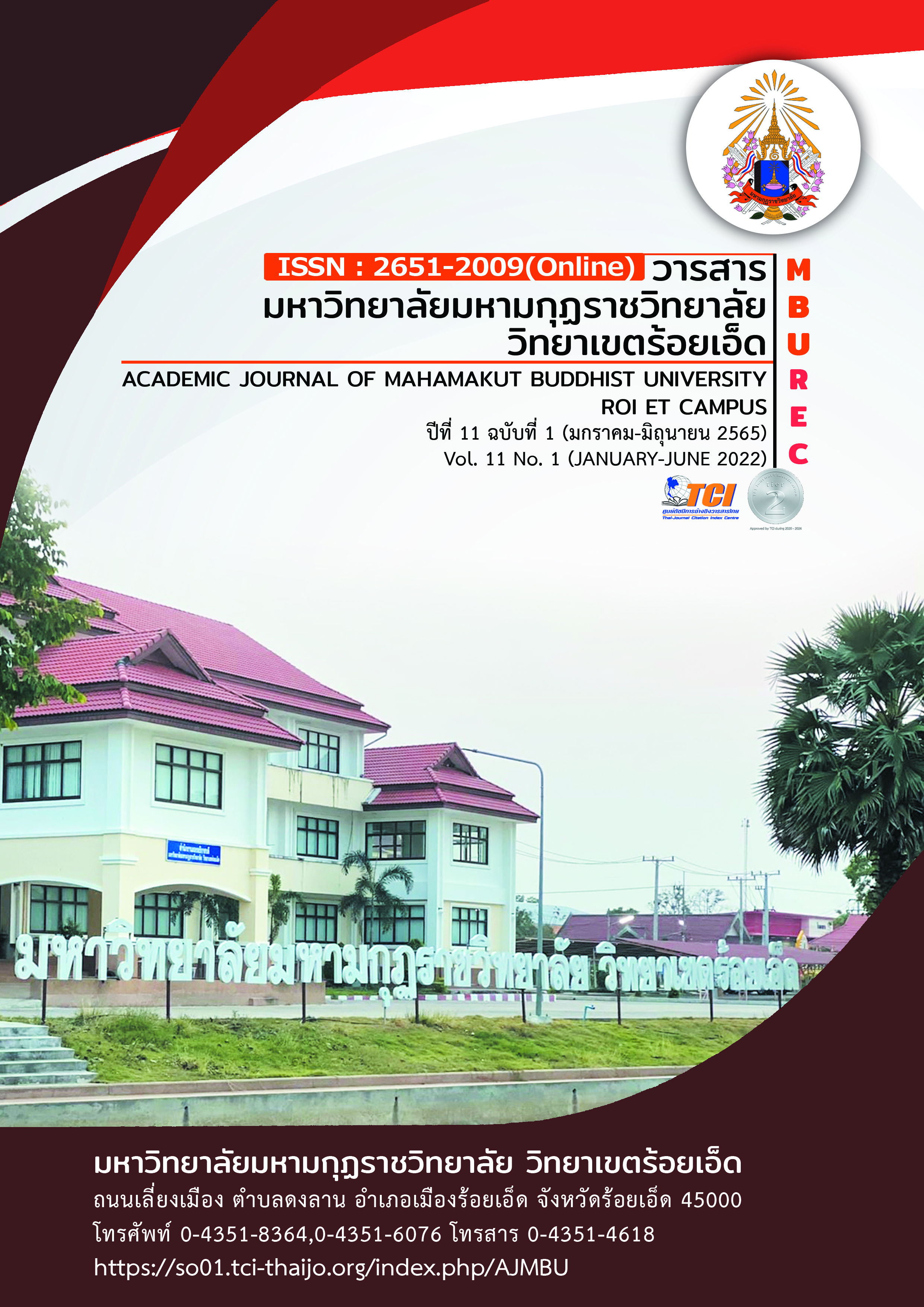THE POLITICS OF APPOINTING HONORIFIC
Main Article Content
Abstract
This research article is aimed 1) to study about the current structure of the government system which is used by monks or Sangha as a guideline to be appointed for the honorific, and 2) to study about the procedures of making a relationship of the Sangha group or the monk group to be appointed for the honorific. This research is a qualitative research. The research instrument is in-depth interview. There are 30 informants in this study and the data was descriptively analyzed.
The research result revealed that; 1. the current structure of the governance system which is used by monks or Sangha as a guideline to be appointed for the honorific, according to Sangha Act B.E. 2505 ( Second Edition), Sangha Act B.E. 2535, (Third Edition) Sangha Act B.E. 2560, (Fourth Edition) B.E. 2561 concerning the structure of the governance system of the Sangha group, reveal in overall that the Sangha governance and the position taking as well as the priest rank appointing of authoritative monks in different levels in order to appoint the criteria of the Sangha to be nominated and appointed both in normal and special methods or it relies on the power of the relationship in order to help being nominated or being promoted by using the method of power of relationship making as well as the outcomes of their works on Buddhist spreading, the outcomes of social works, and the outcomes of the education in Phra Pariyattidhamma School in Dhamma-Pali Section in order for the fan rank of the honorific appointing requisition nowadays. 2. The procedure of making a relationship among Sangha ministry as a guideline to be nominated and honorific appointed reveals that in overall the relationship between the higher-ranking monk and the monk under their governance have already shown some relationship such as students in Phra Pariyattidhamma School or having the same teacher, including their personal childhood friendship during their study. These factors could help support the nomination or appointing honorific of the Sangha ministry to a higher-ranking one which may affect the requisition of other monks who also request for the honorific appointing.
Article Details

This work is licensed under a Creative Commons Attribution-NonCommercial-NoDerivatives 4.0 International License.
References
ชาญณรงค์ บุญหนุน. (2541). แนวคิดและรูปแบบการปกครองคณะสงฆ์ไทย พุทธศาสน์ศึกษาปีที่ 5 ฉบับที่ 2-3 (พ.ค.-ธ.ค.2541). กรุงเทพมหานคร : จุฬาลงกรณ์มหาวิทยาลัย.
ชาย โพธิสิตา. (2562). ศาสตร์และศิลป์ แห่งการวิจัยเชิงคุณภาพ. กรุงเทพมหานคร : อมรินทร์พริ้นติ้งแอนด์พับลิชชิ่ง.
ไทยรัฐฉบับพิมพ์. (2560). พระมหามุนีวงศ์ สังฆราชองค์ที่ 20. สืบค้นเมื่อ 20 กุมภาพันธ์ 2564. จาก https://www.thairath.co.th/content/853792
ธนิต อยู่โพธิ์. (2516). ตำนานสมเด็จพระวันรัต และสมเด็จพระราชาคณะผู้ทรงสมณศักดิ์ สมเด็จพระวันรัตในสมัยกรุงรัตนโกสินทร์. กรุงเทพมหานคร : ศิวพร.
นิธิ เอียวศรีวงศ์. (2543). พุทธศาสนาในความเปลี่ยนแปลงของสังคมไทย. กรุงเทพมหานคร : มูลนิธิโกมลคีมทอง.
ประสก ธรรมรักษา และคามหุโณ. (2518). ขุนนางพระ: ฉบับรับขวัญยุวสงฆ์ลานอโศกและผ่าตัดสมณศักดิ์. กรุงเทพมหานคร : ธรรมบูชา.
พระณรงค์ สังขวิจิตร.(2558). การปกครองคณะสงฆ์ไทยปัจจุบัน: ปัญหาและแนวทางแก้ไข. วิทยานิพนธ์ศิลปศาสตรมหาบัณฑิต สาขาวิชาพุทธศาสนา. มหาวิทยาลัยธรรมศาสตร์.
พระมหานิรุตต์ ฐิตสํวโร. (2551). คู่มือสมณศักดิ์ พัดยศ ฉบับสมบูรณ์. กรุงเทพมหานคร : ธงธรรม.
พระมหาไพฑูรย์ วรรณบุตร. (2550). ประวัติการบริหารคณะสงฆ์ไทย. กรุงเทพมหานคร : มหาวิทยาลัยศรีปทุม.
พระราชบัญญัติคณะสงฆ์ (ฉบับที่ 4). (2561). ราชกิจจานุเบกษา เล่ม 135 ตอน 50.
สกอตต์, เจ. ซี. (2545). การเมืองในระบบผู้อุปถัมภ์กับผู้รับอุปถัมภ์และการเปลี่ยนแปลงทางการเมืองในเอเชียตะวันออกเฉียงใต้ ปรีชา คุวินทร์พันธุ์, ผู้แปล. ใน อมรา พงศาพิชญ์ และปรีชา คุวินทร์พันธุ์ (บรรณาธิการ.) ระบบอุปถัมภ์. พิมพ์ครั้งที่ 3. กรุงเทพมหานคร : จุฬาลงกรณ์มหาวิทยาลัย.
สายธาร อินทวดี. (2533). บทบาทของมหาเถรสมาคมในการแก้ไขปัญหาคณะสงฆ์ไทย (พ.ศ.2445-2530). สารนิพนธ์การศึกษามหาบัณฑิต สาขาวิชาเอกประวัติศาสตร์. มหาวิทยาลัยศรีนครินทรวิโรฒ.
สุรพศ ทวีศักดิ์. (2554). สังคมสงฆ์และพุทธศาสนา: มรดกสมบูรณาญาสิทธิราชย์. สืบค้นเมื่อ 21 สิงหาคม 2563. จาก http://prachatai.com/journal/2011/09/37091
อมรา พงศาพิชญ์ และปรีชา คุวินทร์พันธ์. (2545). ระบบอุปถัมภ์. กรุงเทพมหานคร : อมรินทร์พรินติงแอนด์พับลิชชิ่ง.
ฮอลล์, เอ. (2545). ความสัมพันธ์ระหว่างผู้อุปถัมภ์และผู้รับอุปถัมภ์ แนวคิด และคำศัพท์ ปรีชา คุวินทร์พันธุ์, ผู้แปล. ใน อมรา พงศาพิชญ์ และ ปรีชา คุวินทร์พันธุ์ (บรรณาธิการ.) ระบบ อุปถัมภ์. พิมพ์ครั้งที่ 3. กรุงเทพมหานคร : จุฬาลงกรณ์มหาวิทยาลัย.


